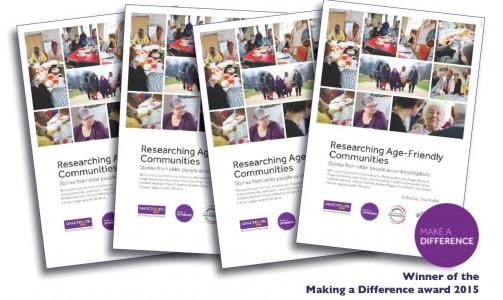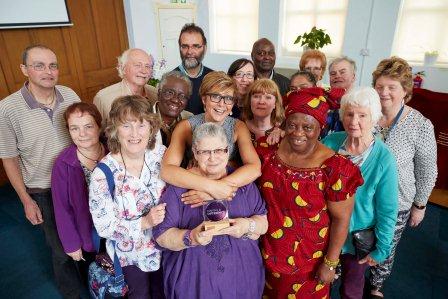Researching Age-friendly Cities: new guide and film to working with older people as co-researchers

A new guide and accompanying film to working with older people as co-researchers has been launched by the Manchester Institute for Collaborative Research on Ageing (MICRA). Edited by Dr. Tine Buffel (EU Marie Curie Fellow researcher), and produced in partnership with Age UK and Age-friendly Manchester (Manchester City Council), the guide and film share stories from older people as they step beyond the traditional role of consultee to that of interviewer and researcher.
To create age-friendly communities the knowledge about what needs to be done has to come from the older residents. It is their city, their neighbourhoods, and their home. To do this you need people to participate and this guide provides an excellent example of a commitment to training older people to be the co-researchers, learn new skills and contribute to change in their environment. Through innovative partnerships, this guide and accompanying video are a must for anyone serious about community development that includes all ages (Professor Sheila Peace, President British Society of Gerontology).
The aim of the research was to identify the issues older residents themselves viewed as important in developing the age-friendliness of their neighbourhood. A further aim was to involve older people, not only as the research target group, but also as experts and actors in the planning, design, development and implementation of the study.
Working with targeted groups in neighbourhoods of South Manchester (UK), three key features shape this research:
- Participation: Older residents act as co-investigators at all stages of the process, including planning, design and implementation.
- Collaboration: A range of partners – local government, third sector, NGOs – act as advisors, contributing via focus groups, interviews and ongoing partnership work.
- Action: Recommendations have been generated for urban design, regeneration, community engagement and policy implementation. This has resulted in insights from this work to be fed directly into social programmes and initiatives, in Manchester and beyond.
A diverse group of eighteen older residents, aged between fifty-eight and seventy-four, were trained as co-investigators. The purpose of the training sessions was to ensure that every co-researcher had a thorough understanding of the different phases involved in conducting a participatory research project. The training provided an overview of the different components of the research process, such as designing the research materials, interviewing techniques, data analysis, and translating the findings into practice.
The co-researchers conducted 68 interviews across the three neighbourhoods with older people who were experiencing social exclusion, isolation, poverty or health problems. The interviews focused on ways of improving the quality of life for older people living in urban communities. During the training sessions, attention was given to the design of the research so that it was especially sensitive to marginalised voices within the community.
As a result of the research, three important principles have been established in terms of promoting age-friendly neighbourhoods:
- First, they must provide a mechanism for empowering older people and ensuring broad social participation.
- Second, they are a reminder of the importance of ‘citizen rights’ in terms of ensuring full and active use of a city’s resources and services.
- Third, they affirm the importance of recognising the multi-layered nature of the urban environment, where social and physical constraints affect the lives of older people in a variety of ways.
Taken as a whole, this research project represents a significant advance in research methodology and in developing new models of community engagement. Crucially, it contributes to re-thinking public policy in relation to age-friendly cities, drawing on the direct involvement of older people themselves.
Key investigators
- Dr Tine Buffel (Principal Investigator)
- Professor Chris Phillipson (Supervisor)
- Rebecca Bromley (Researcher)
Project partners
- Age-friendly Manchester
- Whalley Range Community Forum
- Chorlton Good Neighbours
- Manchester Institute for Collaborative Research on Ageing (MICRA)
- Age UK
The work carried out in Manchester has received various accolades, including winning the ‘Outstanding Local Community Collaboration Award’ at the 2015 University of Manchester Social Responsibility Awards.
View the film on the project “Researching Age-friendly Cities” (2015)
Read more about the Guide: Researching Age-Friendly Communities. Stories from Older People as Co-Investigators (2015)


